Look up free Michigan divorce records and uncover relevant information about any state resident’s marital status. Facts about the spouses, when the divorce happened, the case details, and more are readily available to anyone interested.
The Michigan Freedom of Information Act requires that public offices make records available for the public to request and access whenever someone needs that information.
Anyone can request and obtain divorce records information, and this resource lays out the various databases, search tools, and record custodian details that can be used to accomplish a successful divorce record lookup in Michigan.
This article points readers in the right direction to efficiently find the Michigan divorce documents they’re looking for.
Who Is Allowed To Access Divorce Information in Michigan?
Divorces in Michigan are governed by the Revised Statutes from 1846, which details all the rules and regulations for marriage dissolutions and annulments alike.1
Divorce records in Michigan are public records, and anyone can request a certificate with information about any individual who has gotten a divorce in the state. Records that the court has sealed are the only exception to this rule, but it’s not an easy task to convince a judge in Michigan that a decree should be kept away from the public. Those are very rare.
There are different types of divorce certificates that a citizen can obtain in Michigan. All the records are available to anyone and may be requested as needed with no restrictions. These are the options:
- Divorce certified copies – are available for events since 1897 and include information such as names of spouses, their parents, important dates, and more.
- Divorce authenticated copies with apostille – are usually required by foreign governments when someone is adopting a child, getting married abroad, etc. These cannot be used in the United States.
- Divorce verification – is a document including less information than a certified copy and will only confirm if an individual has gotten a divorce in the past or not.
- No divorce authenticated with apostille – is a document that will confirm an individual’s single status so that they can get married abroad. It can’t be used in the United States.
Considering all the options available, citizens interested in divorce records should find out which form of the document is needed for what they wish to accomplish to avoid ordering the incorrect one.
According to recent statistics, over 20k divorces were filed in Michigan in 2022. This is less than the average in the United States. Also, the number of divorces per year in Michigan seems to be trending down in the last decade.
The average age of men filing for a divorce is 44 years, while the average age for women is 41.2 Most marriages seem to last about 10 years before the divorce papers are filed.
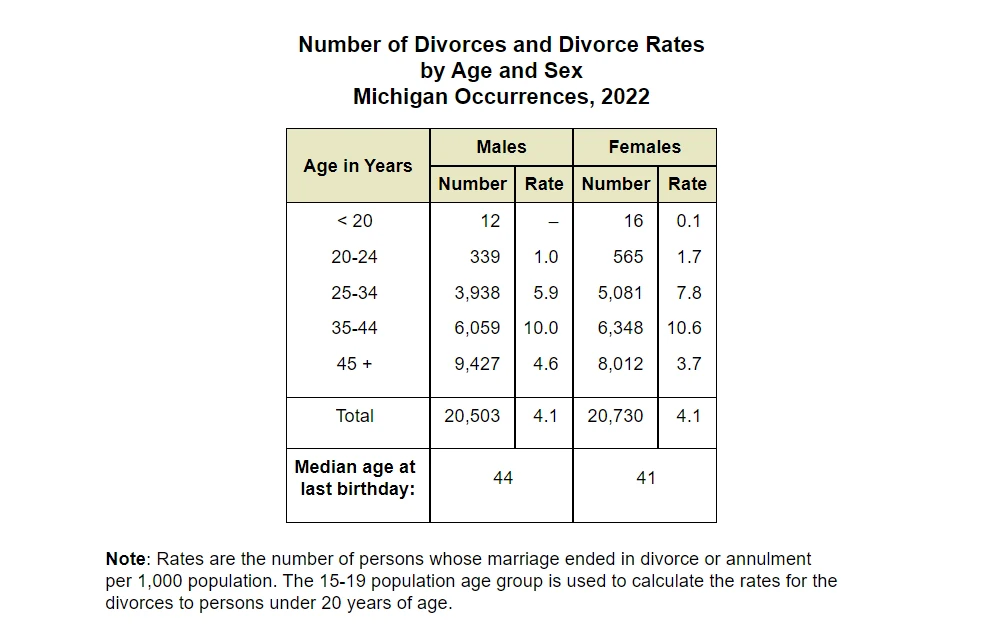
How To Obtain Michigan Divorce Records at No Cost
Michigan offers a free public divorce records search through the MiCourt tool.3 This online search system allows people to search all sorts of court cases in the state (including divorces) as long as they know the county court where the case was handled.
After selecting which database should be searched, users can look up information about any individual. Searches can be performed by name, year of birth of one of the spouses, year when the case was filed, and case number, for example.
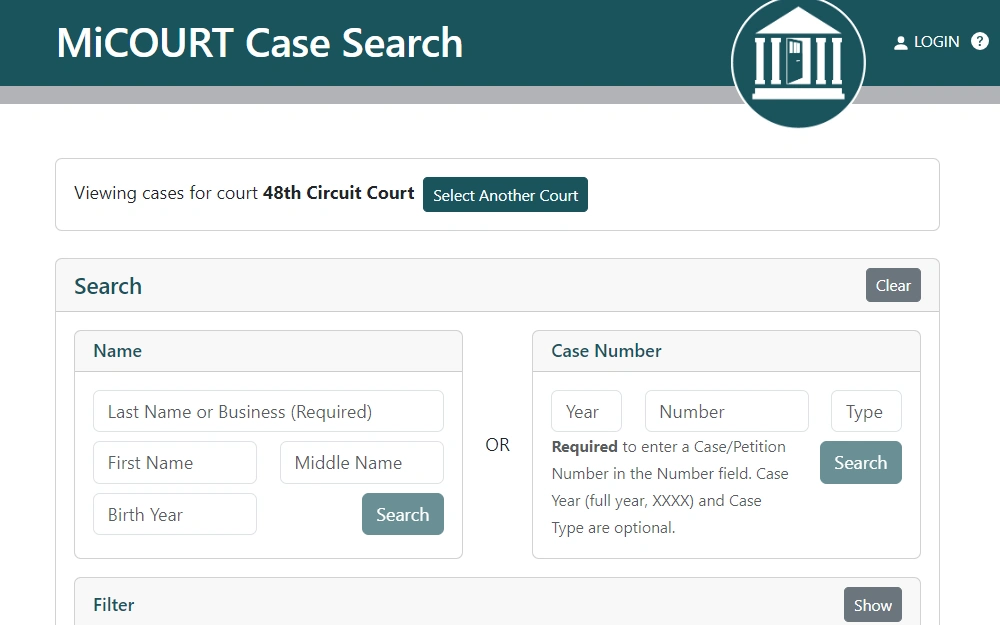
This free public divorce records search won’t lead to an official certificate but will provide valuable information about the case the user is interested in, including if it was resolved through arbitration, for example. The results will also show different cases, such as alimony and other matters that the courts may have handled.
In order to obtain a proper certificate, citizens can work with the Michigan Vital Records Office. They provide divorce decrees from 1987 to the present date, and individuals can make requests in person, by mail, or using the office’s drop box.
Requests in person require that the interested party make an appointment. They don’t see walk-ins, and appointments must be scheduled online up to 30 days in advance.5 Certified copies of divorce records cost $34 for the first copy and $16 for each extra copy ordered simultaneously.
For mail orders, citizens must fill out the correct application (based on what kind of certificate they need to obtain). All applications can be found online, and the office asks that separate payments be sent for each filed application.
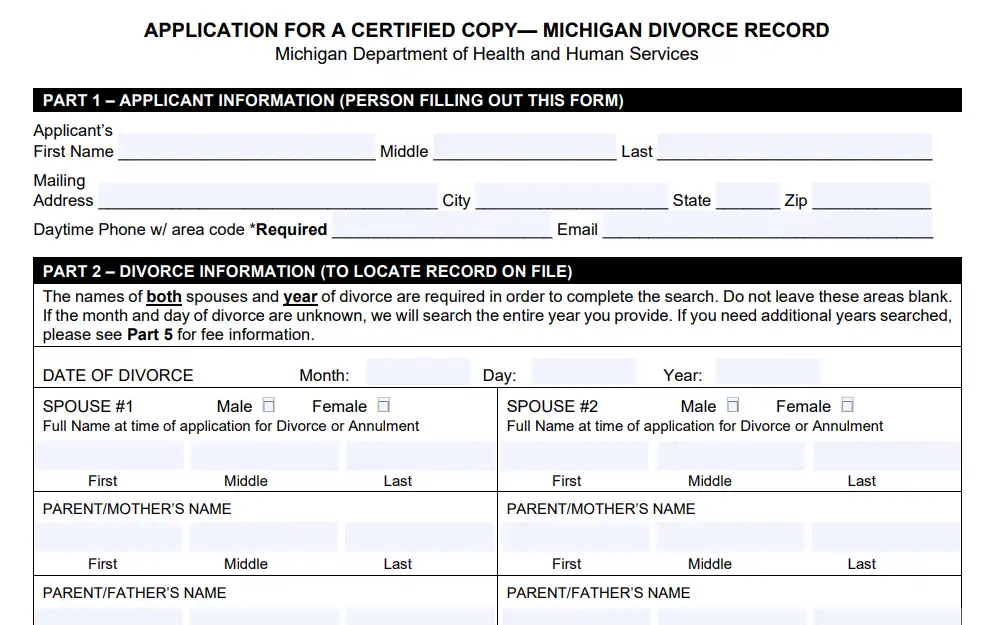
They also ask that self-addressed envelopes aren’t sent with the mail order, as they’ll take care of that by sending the ordered certificate via first-class mail. For expedited shipping forms, citizens can place their orders online (as explained below).
Mail orders should be sent to the following address:
Michigan Vital Records Office
PO Box 30721
Lansing, MI 30721
Mail orders can take up to 4 weeks to be responded to. To expedite the process, it’s possible to use the Vital Records Office drop box and leave the paperwork there. Citizens looking to do that should prepare an envelope just like they would for a mail-in order, but instead of stamping it and mailing it out, just leave it at the drop-off box located in the office’s lobby.
This is the address for the Michigan Vital Records Office, as well as their contact information, for all in-person and drop-off orders:
Michigan Vital Records Office
333 S. Grand Avenue
Lansing, MI 48933
Phone: 517-335-8666
Email: [email protected]
Interested citizens can also place orders online through the government-endorsed third-party service called VitalChek. In this case, additional fees apply. On the other hand, this option allows for expedited shipping when the individual making a request is in a hurry.
Searching County Agencies in MI for Divorce Records
Sometimes, when searching for records, it’s more productive to work with local agencies to obtain the needed information.
In Michigan, for example, the local county clerk offices can help citizens uncover divorce records. Whenever there are questions or research is needed, it may be easier to contact them than bigger state agencies.
Local offices tend to be smaller and have a more attentive team that may be willing to take the time to work with individuals to find the information they’re looking for.
The Wayne County Clerk’s Office, for instance, helps citizens in many different ways.7 It’s possible to look up records online using the OPA (Odyssey Public Access) system and uncover unofficial information. In cases where information is all that’s needed, and records copies aren’t necessary, this might be a good option.
Searching the OPA system is free. Users must accept the terms of use and opt to search the non-criminal cases. After that, they can search by name or other details about the case they’re interested in.
You can obtain Wayne County divorce records from 1942 to the present, and those who are interested can place orders in person, by mail, or via email. In all cases, they must fill out an application with as much detail as possible so that the office can locate the proper divorce case. The application is available online by clicking on the button “Divorce Record Request” on the Clerk’s Office page.
This is the place where people can go (or send their requests to) in Wayne County:
Wayne County Clerk Records Division
Coleman A. Young Municipal Center
Room LL61, 2 Woodward Ave
Detroit, MI 48226
Phone: 313-967-6938
Email: [email protected]
Wayne County also partners with VitalChek as an option to obtain divorce records. Their system charges extra fees for the convenience of providing this service online.
The Oakland County Clerk’s Office also assists concerned citizens in finding divorce records. A free online search is available for all cases handled in the county, including divorce.8 The Court Explorer system allows for searches by name, and if the advanced search option is chosen, it’s possible to narrow the search by year and case type.
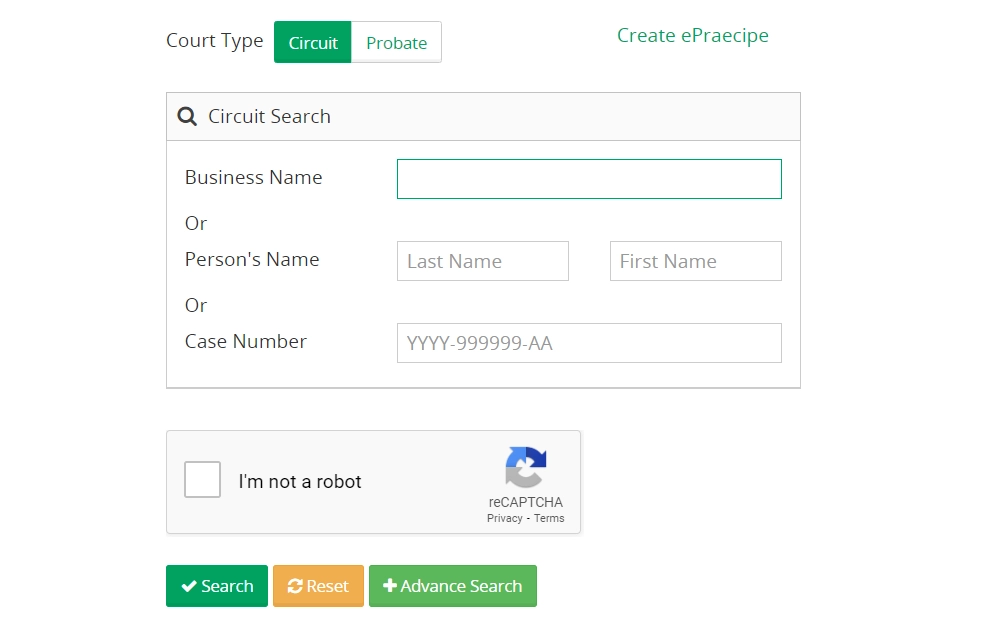
The results will present a hyperlink whenever more information about that particular case is available. Users can click on it and look at the details. In some cases, it’s possible to order copies of documents online – the system will indicate that opportunity, and users can request those documents using a debit or credit card.
If the desired document isn’t available, users can contact the office directly and request them. For those who wish to order copies of divorce certificates or decrees, it’s possible to make a request with the Clerk’s Office in person or by mail. This is their contact information:
Oakland County Clerk’s Office
Register of Deeds
1200 N. Telegraph Rd., Bldg. 12E
Pontiac, MI 48341
Phone: 248-858-0581
Email: [email protected]
Interested parties can check out the tutorial on retrieving Oakland County divorce details for further insight.
Getting divorce records in Macomb County follow the same pattern as the other counties mentioned here. The Clerk’s Office assists citizens for free with CourtView, and at their office when copies of divorce records are needed.
When using CourtView, citizens can search cases by name and select a kind of case to look up: divorce with no children, divorce with minor children, etc. The system allows users to click on the case they wish to uncover and see its details.
When more than just looking up cases is needed, citizens can visit the Macomb County Clerk’s Office in person or place a request by fax or mail.9 When making an order by fax or mail, it’s important that interested individuals fill out a Documents Order Form.
Prices for copies of documents vary, depending on what’s needed. However, the full fee schedule is available online. Simple copies cost $2 each, and certified copies cost $10 for the first page and $ for each extra page that is requested. When in doubt about how much the desired documents will cost, citizens should contact the office directly using the following information:
Macomb County Clerk – Court Section
40 N Main St.
Mount Clemens, Michigan 48043
Phone: 586-469-5351
Fax: 586-469-5365
Older records can also be found through archives and other helpful resources and custodians; further details on these historical records will be outlined below.
Viewing Free Historical Divorce Records via the Michigan State Archives
The Vital Records Office assists citizens in obtaining statewide divorce records that go back as far as 1897.10 This makes it quite convenient for people to research their genealogy or ancestor’s records when needed.
However, other tools can be used when the information provided by the Vital Records Office is insufficient. The Michigan History Center is responsible for keeping the state’s archives and indexes, including many nuptial and divorce indexes. They keep those resources organized by county, making it relatively streamlined to search for information.
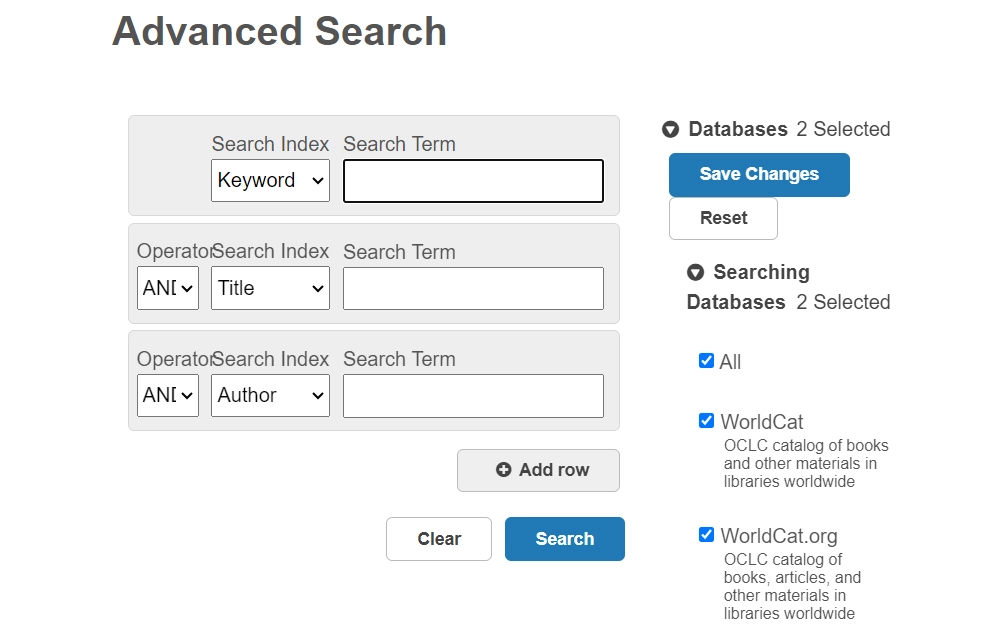
Interested individuals can refer to the guides provided for each county to find out what’s available for them regarding sources and data.12 Other resources can also be useful, and citizens can access them through their website or in person at the following address:
Michigan Library & History Center – Archives
702 W. Kalamazoo Street
Lansing, MI 48915
Phone: 517-335-2576
Email: [email protected]
Does Michigan Allow Common Law Marriages & Divorces?
For a long time, the state of Michigan recognized common-law marriages. That changed in 1957, and since then, only proper marriages (with a license and a registration, for instance) are considered valid.
However, common law marriages that were established before 1957 remain valid. Likewise, common law marriages established in states that continue to allow it are recognized and considered valid in Michigan — as long as the parties have something to prove their relationship is accepted in the state where it was established.
On the other hand, Michigan doesn’t have a provision to recognize civil unions. It means that it doesn’t matter how long two people have been living together, they won’t be considered a couple in the eyes of the state.
When people in Michigan want to share a life but don’t wish to walk down the aisle for their nuptials, the alternative is establishing a cohabitation agreement. Such agreements are valid in Michigan, and an attorney will be able to draft an agreement that will address both party’s needs and expectations.
Cohabitation agreements would hold up in court if something unexpected happened and would protect the parties involved in this relationship if they decide to separate.
Individuals in a common-law marriage that is recognized who wish to separate must get a divorce. How to file for a divorce in Michigan – including common law divorce – will be addressed below.
How To Approach the Divorce Process in Michigan: Filing & Addressing Divorce Papers
Michigan is considered a no-fault state for divorces, meaning an individual doesn’t need a reason or that their spouse does something considered “wrong” to file for a divorce. According to the Revised Statutes of 1846, all someone needs to argue is that the marriage is broken beyond repair, using the statutory language in the law.13
For anyone interested in details about what’s allowed or required in a divorce petition, Jackson County offers plenty of information on its website.14
In general, the person who files for divorce has to be a Michigan resident for at least 180 days before the filing date. It’s also mandatory that they’ve lived in the county where the divorce will be filed for at least ten days before the filing date.
The Family Division of the Circuit Court handles all divorce petitions, and there’s a waiting period before the divorce is finalized, even when all the details have been settled.
For divorces of couples with no children, the waiting period is 60 days. When children are involved, the waiting period increases to 6 months. Individuals should mind those periods, especially if they intend to remarry soon.
In Michigan, it isn’t mandatory for spouses to have a lawyer when filing or settling a divorce. However, to avoid complications, it’s always recommended that both parties retain their own experienced attorney. Especially when children are involved, the couple has property, or any other complications are in place, having an attorney to ensure all laws and procedures are followed tends to be the best course of action.
It is possible to resolve the issues around a divorce with mediation out of the courts. However, Michigan allows for a divorce to be granted, even if one of the parties doesn’t want it. So when someone is served divorce papers, it’s important not to ignore them but to learn their rights.
When served with papers for a divorce that was filed, the defendant has 21 days to respond (or 28 days if the summons was delivered via mail). They also don’t have to accept the terms of the filing and are allowed to file a counterclaim to determine what are their wishes and desires as this relationship comes to an end.
No citizen should be afraid of learning their rights and pursuing them. Michigan divorce records are available so anyone can uncover desired information.
You can refer to the Michigan public information search tutorial for guidance on accessing free records on anyone throughout the state — whether regarding warrants, arrests, births, deaths, background checks, or other public records.
References
1Michigan Legislature. (n.d.). R-S-1846-552-1-84-DIVORCE. Retrieved November 10, 2023, from <https://www.legislature.mi.gov/(S(053ahlsjz00wf5btd4piweeu))/mileg.aspx?page=getObject&objectName=mcl-R-S-1846-552-1-84-DIVORCE>
2Michigan Department of Health & Human Services. (2022). Number of Divorces and Divorce Rates by Age and Sex Michigan Occurrences, 2022. Retrieved November 10, 2023, from <https://www.mdch.state.mi.us/osr/marriage/DivorceByAgeSex.asp>
3Michigan Courts. (n.d.). Court Selection. MiCOURT Case Search. Retrieved November 10, 2023, from <https://micourt.courts.michigan.gov/case-search/court-selection>
4MiCOURT. (n.d.). MiCOURT Case Search. Retrieved November 10, 2023, from <https://micourt.courts.michigan.gov/case-search/court/C48>
5Michigan Department of Health & Human Services. (n.d.). Schedule Appointment. Retrieved November 10, 2023, from <https://www.michigan.gov/mdhhs/doing-business/vitalrecords/schedule-appointment>
6Michigan Department of Health & Human Services. (2023, March). Application for Certified Copy of Michigan Divorce Record. Retrieved November 10, 2023, from <https://www.michigan.gov/mdhhs/-/media/Project/Websites/mdhhs/Folder1/Folder3/divorapp.pdf?rev=13ad58d06c844ab681b34c982e664ae5&hash=60F91B858E674EC26C5EC0CBE654CC4A>
7Wayne County Clerk Records Division. (n.d.). Records. Retrieved November 10, 2023, from <https://www.waynecounty.com/elected/clerk/records.aspx>
8Oakland County Clerk’s Office. (n.d.). Court Explorer. Retrieved November 10, 2023, from <https://courtexplorer.oakgov.com/OaklandCounty>
9Macomb County Clerk/Register of Deeds. (n.d.). Clerk – Court Section. Retrieved November 10, 2023, from <https://clerk.macombgov.org/Clerk-Services-CourtFileroom>
10Michigan Department of Health & Human Services. (n.d.). Birth, Death, Marriage and Divorce Records. Retrieved November 10, 2023, from <https://www.michigan.gov/mdhhs/doing-business/vitalrecords>
11Michigan State Archives. (n.d.). Advanced Search. Online Catalog Search. Retrieved November 10, 2023, from <https://archivesofmichigan.on.worldcat.org/advancedsearch?queryString=&databaseList=>
12Michigan History Center. (n.d.). County Guides. Retrieved November 10, 2023, from <https://www.michigan.gov/mhc/archives/archive-collections/county-guides>
13Michigan Legislature. (n.d.). Section 552.6. Revised Statutes of 1846 (EXCERPT). Retrieved November 10, 2023, from <https://www.legislature.mi.gov/(S(hijk2iihlmrxrmk52bfsvzhv))/mileg.aspx?page=getobject&objectname=mcl-552-6>
14Jackson County, Michigan Government. (n.d.). Civil Division – Divorce. Retrieved November 10, 2023, from <https://www.mijackson.org/FAQ.aspx?QID=219>
